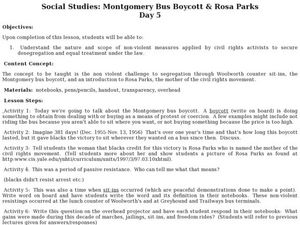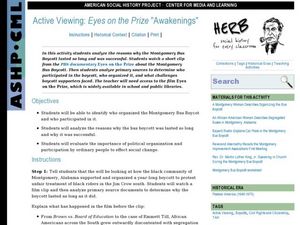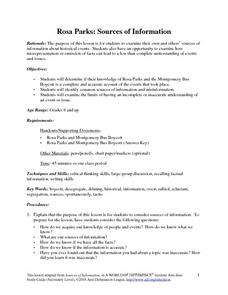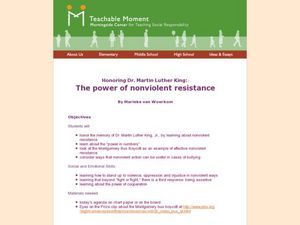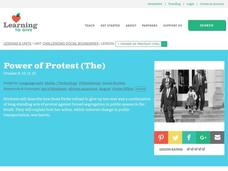Alabama Department of Archives and History
Montgomery Bus Boycott: We Would Rather Walk!
Have historians use primary sources to learn about the circumstances and implementation of the Montgomery Bus Boycott, and think about the issue of boycotts as a means of effecting social change. Wrap it up with a...
Stanford University
Lesson Plan: Montgomery Bus Boycott
Most of us have heard of Rosa Parks, the Montgomery Bus Boycott, and Martin Luther King, Jr. But what about Claudette Colvin, Virginia Durr, Freedom Summer, or the Birmingham Children's Crusade? A five-lesson unit prompts class...
Curated OER
Expanding the Story of the Montgomery Bus Boycott
Introduce the class to the Civil Rights Movement by taking a critical look at the Montgomery Bus Boycott in 1955. They will pay close attention to the role women played in organizing the boycott and bringing national attention to the...
EngageNY
Close Reading: The Montgomery Bus Boycott Speech
How did Martin Luther King, Jr. sway people with his speeches? Scholars carry out a close reading of the Montgomery Bus Boycott speech and use the Close Reading Guide to help them work through the powerful text. While reading, they...
EngageNY
Analyzing Language in a Speech: The Montgomery Bus Boycott Speech
Scholars analyze the use of active and passive voice in The Montgomery Bus Boycott speech and refer to an Active and Passive Sentences handout while viewing the text. Pairs of learners then work together to identify passive and active...
Curated OER
Rosa Parks and the Montgomery Bus Boycott
Students dramatize incident that started the civil rights movement of the 1950s and 1960s: Rosa Parks's refusal to give up her seat on a bus in Montgomery, Alabama.
Roy Rosenzweig Center for History and New Media
Rosa Parks and the Montgomery Bus Boycott
Participants examine two documents related to Rosa Parks and the bus boycott, sources that challenge some of the commonly held preconceptions about Rosa Parks. They then respond to discussion questions to reinforce...
Curated OER
Fair Responses to Unfair Acts
Young scholars understand the sacrifices and problems in undoing an unfair situation. In this unfairness instructional activity, students discuss the reasons for the Montgomery Boycott and discuss worksheet and feelings about dealing...
Alabama Department of Archives and History
How Would You Feel? The Bravery of Civil Disobedience
As part of their study of the US Civil Rights Movement and the Montgomery bus boycott, class members read Dr. Martin Luther King's "Integrated Bus Suggestions." They then craft a short story about the first week of Montgomery...
Curated OER
Montgomery Bus Boycott
Young scholars investigate the Montgomery Bus Boycott. For this American Civil Rights Movement lesson, students determine whether or not they would have taken part in the boycott and write a 5 paragraph essay about the implications of...
Curated OER
Role of Citizens in Montgomery Bus Boycott
Students consider the role of average Americans in the Montgomery Bus Boycott. In this Civil Rights instructional activity, students listen to a lecture that outlines the details of the boycott. Students conduct further research about...
Curated OER
Montgomery Bus Boycott & Rosa Parks Day 5
Learners study the Montgomery Bus Boycott. For this American Civil Rights lesson, students listen to a lecture about segregation, Rosa Parks, and the bus boycott. Learners discuss passive resistance and its effectiveness.
Curated OER
Active Viewing: Eyes on the Prize "Awakenings"
Dive deeper into the Montgomery Bus Boycott with this multi-stage lesson, centered on the essential question: Why did the boycott last so long? Historians investigate the Jim Crow south through a video clip (not included), then analyze...
Curated OER
Civil Rights: Rosa Parks Centers
Research the Montgomery Bus Boycott and Rosa Parks. Set up different centers and have learners rotate through the activities aimed at researching Rosa Parks. They read The Bus Ride that Changed History: The Story of Rosa Parks, write a...
EngageNY
Advantages and Disadvantages of Various Mediums: The Montgomery Bus Boycott Speech
Text, speech, phone call. Scholars discuss the advantages and disadvantages of using speech and written text to express ideas. They use an Analyzing Mediums graphic organizer to analyze speeches by Martin Luther King Jr. They then...
Historical Thinking Matters
Rosa Parks: 5 Day Lesson
What led to the success of the Montgomery Bus Boycott, and how might historians approach this question differently? This rich series of lessons includes a short introductory video clip, analysis of six primary source documents, and...
Curated OER
Claudette Colvin: Twice Toward Justice
Use the historical account of Claudette Colvin to study civil rights and connect past injustices to modern issues. As learners read, they examine chapter titles, record quotes, and participate in discussion. Next, they research...
Anti-Defamation League
Rosa Parks: Sources of Information
Young scholars show what they know about Rosa Parks and the incident on one of the buses in Montgomery, Alabama. Groups discuss and identify where they receive most of their information. They examine the importance of having a complete...
UnboundEd Learning
Rosa Parks: The Mother of the Civil Rights Movement
Class members listen to a passage on Rosa Parks, examine images of the Montgomery Bus Boycott, and respond to questions based on the text. They then craft a free-verse poem that recounts her achievements and reveals why she is considered...
Academy of American Poets
Teach This Poem: “Making History” by Marilyn Nelson
What makes an event newsworthy, worth a reference in a news magazine or textbook? Who decides? These are questions Marilyn Nelson asks readers of her poem "Making History" to consider. To begin, class members list details they notice in...
Facing History and Ourselves
Protesting Discrimination in Bristol
Using the Bristol Bus Boycott as a case study, class members examine the strategies and levels of power protesters used to effect change. The two-day lesson plan concludes with individuals reflecting on the actions they might take in...
Facing History and Ourselves
Standing Up to Hatred on Cable Street
The final lessons in this section of the Standing Up for Democracy unit ask class members to consider ways they can help create a "more humane, fair, and compassionate environment" in their communities. For context, learners study how...
Curated OER
The Power of Nonviolent Resistance
Students discuss the power of nonviolent resistance in terms of Dr. Martin Luther King and the boycotts that he led. In this nonviolent resistance lesson plan, students discuss their thoughts of nonviolent resistance and how they can use...
Curated OER
The Power of Protest
Students recognize the power of protest. In this civil rights instructional activity, students consider the success of Rosa Parks and her protest that sparked the movement. Students study the Montgomery Bus Boycott in depth and reflect...











